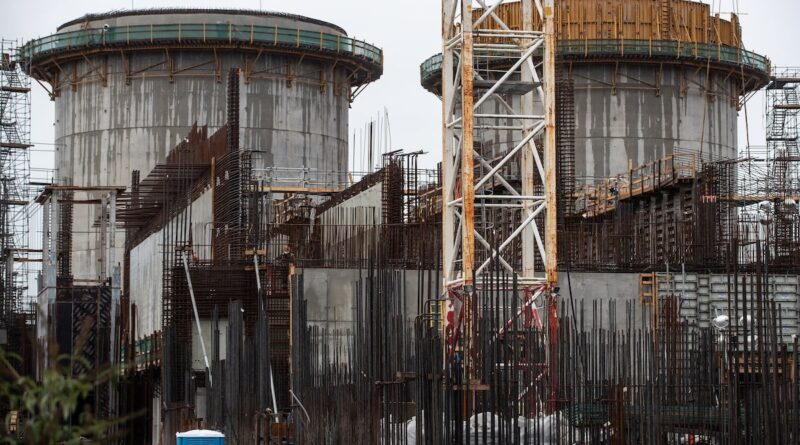Rising costs for planned North Vancouver wastewater treatment plant prompt demands for governance change
The controversy is the result of months of tension and public outrage over the massively over budget North Vancouver water-treatment plant. The plant is seen under construction, on Oct. 22, 2021.DARRYL DYCK/The Globe and Mail
Soaring spending and complaints about lack of accountability and poor governance in the regional body that oversees services in British Columbia’s Lower Mainland has prompted one mayor to seek major changes.
Port Coquitlam Mayor Brad West brought a notice of motion to the Metro Vancouver board meeting Friday that recommended cutting the number of committees by half, putting new limits on pay for meetings, and initiating a comprehensive review of all its core functions.
Mr. West’s motion asked for a “full-scale, external, core-service review with a mandate to identify savings, efficiencies and reductions by examining all departments and service areas and the use of contracted services and consultants.”
Earlier this week, Vancouver Mayor Ken Sim announced he would boycott Metro Vancouver meetings because the organization is so dysfunctional. The move was decried as symbolic on Mr. Sim’s part: the mayor has attended almost no Metro meetings this year and very few last year. At least two councillors from his ABC team have said they plan to continue going to meetings.
Last week, Richmond Councillor Kash Heed said he would not accept the current stipend for attending meetings –$547 for the first four hours, and another $547 if a meeting runs over that length – and urged other directors to follow his lead.
The controversy is the result of months of tension and public outrage over the massively over budget North Vancouver water-treatment plant. Metro Vancouver fired the Spanish company building the plant in 2021, announcing the construction would rise to a likely near $4-billion from an original cost of $700-million in 2018. The cost overruns will result in tax increases for homeowners through the region.
The company, Acciona Wastewater Solutions, has sued Metro. Metro has countersued.
Metro Vancouver is comprised of 21 municipalities, one electoral area and a First Nation. All 27 of B.C.‘s regional districts were created in 1965 to provide a level of government that would deal with sewers, water, and other basics over areas bigger than individual cities. Taxpayers were barely aware of its existence.
But that is changing, as the bills for maintaining infrastructure keep climbing, along with taxes. As well, there has been recent scrutiny over the fees mayors and councillors from the district’s 21 member municipalities, get for attending meetings.
The $700,000 compensation package given to chief administrative officer Jerry Dobrovolny in 2023 raised eyebrows and the loss of $10-million last year on a failed park acquisition on Bowen Island sparked public outrage.
In November, Surrey Councillor Pardeep Kooner sent a lengthy letter to the board noting serious problems at the district. She complained that Metro staff have been able to “pick and choose areas of focus” without direction from councillors and she said planning for large capital projects has little oversight beyond that of Mr. Dobrovolny.
“The top seven Major Capital Projects are being managed by one department, who answers solely to the CAO, with no independent third-party engineering and financial auditor to provide transparency, accountability and evaluate cost-benefit,” she wrote.
As a result of the Acciona lawsuit, the district is now spending double the amount on legal fees that it projected a few years ago – almost $4-million a year. That complex lawsuit is likely to generate even steeper legal costs in the coming years, with the trial not set to take place until March, 2027, according to the most recent court filings.
In response to the flurry of criticism, the district ordered a governance review this month but it has yet to set out terms of reference or choose who will be on it.
Besides the cost of the North Vancouver plant, the district is also looking at $10-billion to replace the Iona water-treatment plant near the Vancouver airport.
Some councillors are defending Metro’s work. North Vancouver District Councillor Lisa Muri argued the issue is more about poor communication rather than poor work and governance.
But others have complained that an overhaul is long overdue.
“Metro is broken, incredibly broken,” former West Vancouver mayor Mary-Ann Booth said in an interview. “There’s no accountability, none.”
She said Metro committee appointments are often handed out as political rewards by regional mayors, since councillors can sometimes make up to $40,000 a year extra just for attending meetings.
As a result, she said, the Metro board and committees often end up being stacked with directors who won’t make a fuss about anything.
She said that directors who have tried to challenge the status quo or CAO, such as herself and City of North Vancouver Mayor Linda Buchanan, along with North and West Van councillors Catherine Pope and Nora Gambioli, were removed from committees or reprimanded.
Ms. Booth said the district, which did operate for years with little complaint, is now facing “the perfect storm.” It’s time, she said, for the province to step in and curb directors’ compensation.
But Surrey Mayor Brenda Locke, although she believes Metro Vancouver desperately needs reforms, said direct elections for district positions probably wouldn’t work since it’s hard enough to get even 30 per cent of voters to vote in civic elections.
But she does think it should re-examine its activities, everything from minor items such as the $580,000 it spends to have a presence at the summer Pacific National Exhibition to bigger items including housing and parks.
“I think that Metro Vancouver has suffered scope creep very badly,” she said.

